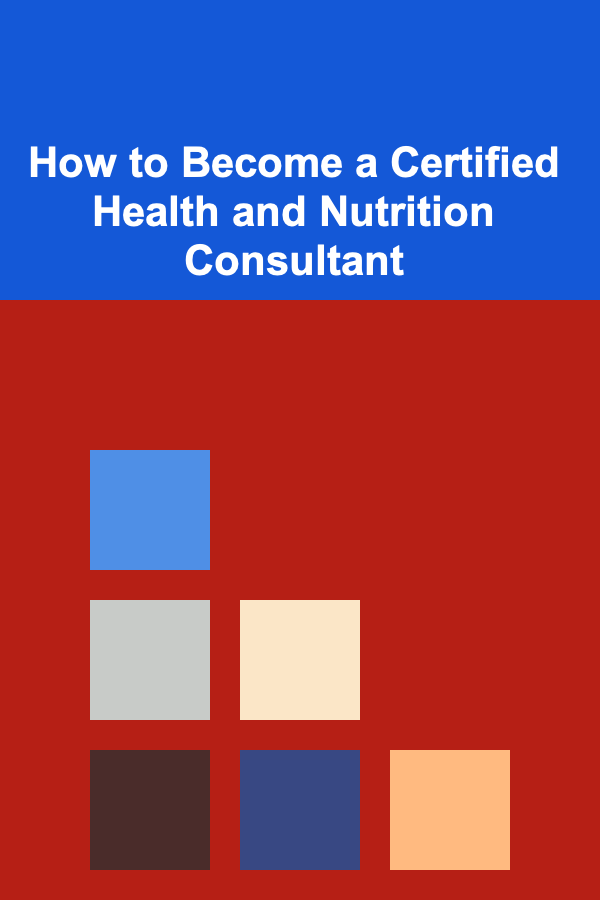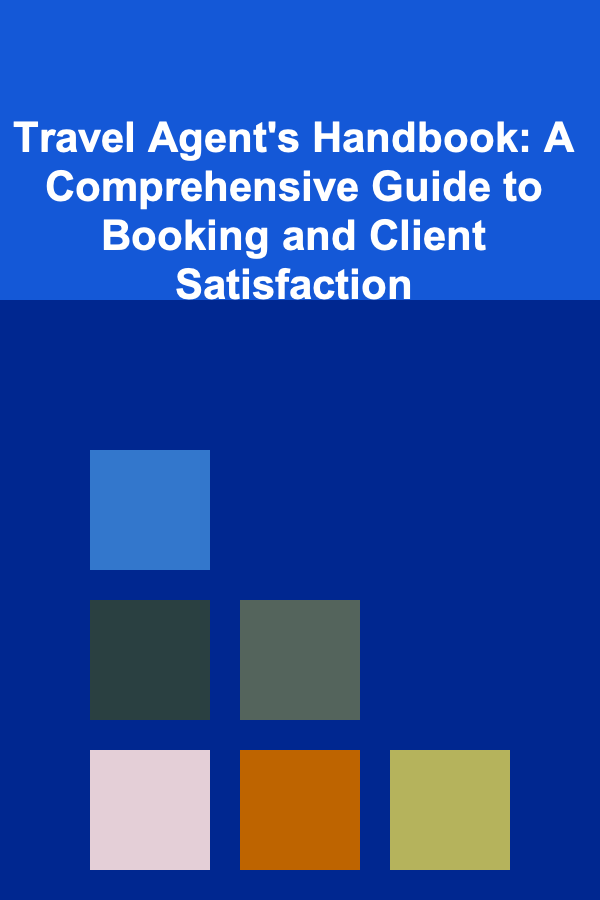
How to Become a Certified Health and Nutrition Consultant
ebook include PDF & Audio bundle (Micro Guide)
$12.99$7.99
Limited Time Offer! Order within the next:

In a world where health and wellness are more prominent than ever, the demand for certified health and nutrition consultants has surged. As individuals become increasingly aware of the importance of balanced diets, proper nutrition, and healthy living, health and nutrition consultants play a crucial role in guiding clients to better health outcomes.
If you're passionate about health, nutrition, and helping others improve their lives, becoming a certified health and nutrition consultant could be the perfect career path for you. This actionable guide will walk you through the steps needed to become a certified health and nutrition consultant, ensuring you have the knowledge and credentials to excel in this rewarding field.
Understand the Role of a Health and Nutrition Consultant
Before diving into the certification process, it's essential to understand what a health and nutrition consultant does and what skills are needed.
A health and nutrition consultant provides guidance and expert advice on nutrition, wellness, and healthy lifestyle choices. They assess clients' nutritional needs, create tailored dietary plans, and offer ongoing support. Consultants may work with individuals, families, or groups and can specialize in a variety of areas, such as:
- Weight management
- Sports nutrition
- Chronic disease prevention
- Pediatric nutrition
- Diabetes and heart health management
Health and nutrition consultants must be empathetic, detail-oriented, and up-to-date with the latest research in health and nutrition. Strong communication and interpersonal skills are also essential as the role involves working closely with clients to understand their specific needs.
Build a Strong Foundation in Health and Nutrition
To become a successful health and nutrition consultant, you must first build a strong foundational knowledge of human biology, nutrition science, and healthy eating practices. While you don't necessarily need a formal degree, having relevant knowledge is crucial.
A. Self-Study and Research
You can start by reading books, scientific journals, and reliable online resources on health and nutrition. Some foundational topics to explore include:
- Macronutrients and Micronutrients: Understanding the role of carbohydrates, proteins, fats, vitamins, and minerals in human health.
- Digestive Health: Learning about the human digestive system and how it processes nutrients.
- Dietary Guidelines: Familiarizing yourself with guidelines from reputable organizations like the World Health Organization (WHO), American Heart Association (AHA), and the U.S. Department of Agriculture (USDA).
- Nutritional Needs at Different Life Stages: Understanding how nutritional needs vary across age groups, such as children, pregnant women, and older adults.
B. Online Courses and Workshops
Many institutions offer online courses in health and nutrition that can serve as a foundation for your career. Look for programs that provide certificates or diplomas in health and nutrition. Some popular options include:
- Coursera: Offers online courses from universities such as Stanford and Yale on nutrition and wellness.
- Udemy: Provides affordable courses that cover a wide range of topics related to health and nutrition.
- National Academy of Sports Medicine (NASM): Specializes in certifications for sports nutrition, which can be valuable if you're interested in working with athletes.
These courses will help you understand basic nutrition principles and equip you with the skills needed to give dietary advice to clients.
Pursue a Formal Education
While self-study can provide a good starting point, pursuing formal education can significantly enhance your credibility and expertise. A formal education can also improve your job prospects, especially if you plan to work with healthcare professionals or in clinical settings.
A. Degree Programs
Consider enrolling in a degree program related to health and nutrition. Relevant degrees include:
- Bachelor's or Master's in Nutrition Science: These programs provide an in-depth understanding of nutrition and its impact on human health. You'll also learn how to design dietary plans, assess health risks, and apply nutritional principles in various settings.
- Bachelor's or Master's in Dietetics: This is a more specialized program that prepares you for a career as a registered dietitian (RD) or nutritionist.
- Public Health or Health Science Degrees: These programs can give you a broader understanding of health management, epidemiology, and disease prevention, which can be beneficial for consulting in a variety of environments.
B. Certifications from Accredited Institutions
In addition to a degree, you may want to pursue certifications from well-known and accredited institutions. Certification not only boosts your credibility but also demonstrates that you have the expertise and knowledge to provide sound advice. Some respected certifications include:
- Certified Nutrition Specialist (CNS): Offered by the Board for Certification of Nutrition Specialists (BCNS), this certification is widely respected in the field of nutrition consulting.
- Certified Health Coach (CHC): This certification, offered by organizations like the National Society of Health Coaches (NSHC), provides training in health coaching, helping you understand how to support and motivate clients in making healthier choices.
- Certified Clinical Nutritionist (CCN): A more advanced certification focusing on clinical nutrition, which is ideal if you plan to work with clients with specific health conditions.
- Certified Personal Trainer with Nutrition Specialization: Offered by organizations like NASM, this certification is beneficial if you want to combine physical fitness training with nutrition counseling, especially for athletes.
Certification programs typically require you to complete coursework, pass an exam, and fulfill continuing education requirements to maintain your certification.
Gain Practical Experience
In addition to formal education and certifications, gaining practical experience is essential for honing your skills as a health and nutrition consultant. There are several ways to accumulate hands-on experience:
A. Internship or Volunteer Work
Internships and volunteer opportunities allow you to apply your knowledge in real-world settings. Many clinics, hospitals, wellness centers, and gyms offer internship opportunities where you can shadow experienced consultants and work with clients under supervision.
B. Start Your Own Practice
Once you have the necessary education and certifications, you can begin practicing as a consultant. Starting your own health and nutrition consultancy is an excellent way to gain practical experience and build a client base. However, be prepared to market yourself effectively, build a network, and continuously learn from your clients.
C. Partner with Healthcare Professionals
Health and nutrition consultants often work in tandem with doctors, dietitians, and other healthcare professionals. By forming partnerships or working in multidisciplinary teams, you can expand your scope of practice and gain exposure to different areas of health and wellness.
Develop Soft Skills and Business Acumen
Beyond the technical knowledge of nutrition, successful health and nutrition consultants need strong soft skills and business acumen. Here are a few important areas to focus on:
A. Communication Skills
As a consultant, you'll need to effectively communicate complex nutritional information in a clear and accessible manner. Clients often look for practical advice and solutions that fit their unique needs, and being able to deliver that information in a supportive and understandable way is essential.
B. Empathy and Emotional Intelligence
Many clients seeking nutritional advice are dealing with personal challenges such as weight loss, chronic health issues, or emotional eating. Having empathy and emotional intelligence will help you build rapport with clients, understand their struggles, and offer the support they need.
C. Business Skills
If you plan to work independently, you'll need business skills to manage your practice. This includes understanding marketing, managing finances, and networking. Some consultants also choose to sell products, such as meal plans, supplements, or healthy food options, which requires a solid grasp of business operations.
Keep Learning and Stay Updated
The field of health and nutrition is constantly evolving, with new research, trends, and guidelines emerging regularly. To stay relevant and provide the best possible service to your clients, you should commit to lifelong learning. This can involve:
- Attending workshops and seminars to stay updated on the latest research and trends.
- Participating in continuing education programs to renew your certifications.
- Reading scientific journals and articles to understand new findings in the field of nutrition.
Conclusion
Becoming a certified health and nutrition consultant is a rewarding journey that combines passion for health with a desire to help others lead better lives. It requires a blend of education, certification, practical experience, and soft skills. By following the steps outlined in this guide, you can position yourself as a knowledgeable, compassionate, and certified professional in the growing field of health and nutrition. Whether you choose to work independently, in a clinical setting, or with a team of healthcare professionals, your expertise will be invaluable in helping clients achieve their health goals.

How to Clean and Sanitize High-Touch Surfaces During Flu Season
Read More
How to Create a Festive Home Office with Holiday Decor
Read More
How to Make Money Online as a Smart Contract Auditor: 10 Actionable Ideas
Read More
How to Make Money Online as a Thrift Store Flipper: 10 Actionable Ideas
Read More
How to Utilize Virtual Events for Dropshipping Industry Insights and Trends
Read More
Travel Agent's Handbook: A Comprehensive Guide to Booking and Client Satisfaction
Read MoreOther Products

How to Clean and Sanitize High-Touch Surfaces During Flu Season
Read More
How to Create a Festive Home Office with Holiday Decor
Read More
How to Make Money Online as a Smart Contract Auditor: 10 Actionable Ideas
Read More
How to Make Money Online as a Thrift Store Flipper: 10 Actionable Ideas
Read More
How to Utilize Virtual Events for Dropshipping Industry Insights and Trends
Read More